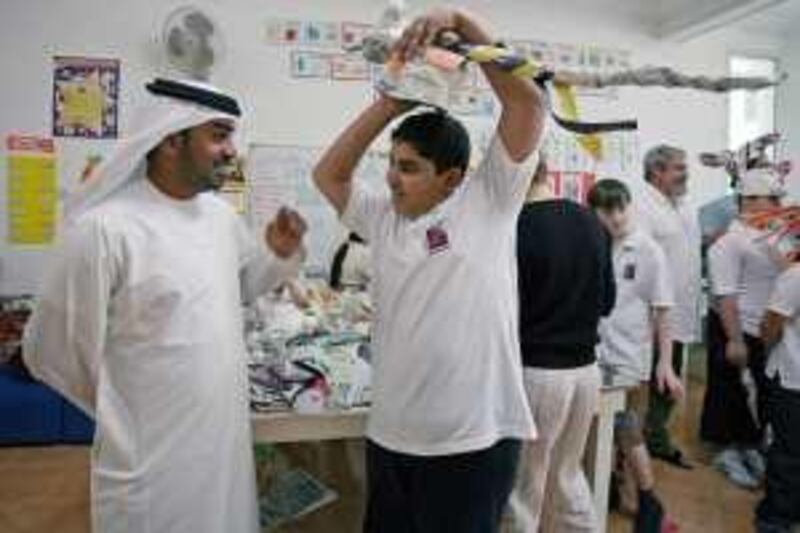ABU DHABI // Eid al Shamsi has by far the best grasp of the English language in his family. He is so good, in fact, that he is teaching his siblings, cousins and parents. The Emirati is also a dab hand in the kitchen, on the farm and on the football pitch. At 14, Eid has an enviable life. But compared to other autistic children, he is one of the lucky ones.
Autism suffers from a lack of understanding in the UAE, with some parents even keeping their autistic children at home for fear of being stigmatised, according to staff from the Future Centre for Special Needs in Abu Dhabi. Unable to socialise, the children's development can be seriously hampered. Eid's father, Saif al Shamsi, a traffic police officer in Abu Dhabi, says this needs to change - which is why he and his son will be among the hundreds of people taking part in an autism awareness walk on the capital's corniche tonight. The event, called Light A Candle, begins at 6.30pm at the junction of Corniche Street and 26th Street.
"The only person I have to answer to and get acceptance from is my God, how would I do this if I cannot say I did the best for my children?" he says. "I cannot close the world and just keep him away from everything. This is not right." Eid has come along in leaps and bounds, thanks in part to a difficult decision by his parents. When he started at the centre, aged five, his parents were told he would cope much better if he concentrated on either the English or Arabic language. Mr al Shamsi chose English.
"It was better for Eid, that is all that mattered," he says. "Now Eid is teaching all the family English. We have a very good family life together." Eid likes to spend most of his free time with his parents and three brothers, going on trips together to the family's farms in Al Ain. "I love my mama and baba," he says cheerfully. "I like to go to Al Ain, it's very nice and I have lots of family there."
Mr al Shamsi says he is not interested in other people's opinions of his son. "There definitely needs to be more awareness but I am not looking for any acceptance. I would never hide him away and say he doesn't exist. I will do everything that is required from a father to a son." Eid is one of around 180 pupils at the centre. Dalal Hayouk, 32, a psychology graduate from Lebanon, has been working there for five years.
"Children are much more accepting," she says. "But some parents don't want to take their children out, it is not good for them. I think it is all to do with awareness. Once we make people aware they won't judge." The non-profit centre receives some government assistance, but also relies heavily on fund-raising - and donations have fallen sharply since the financial crisis. "We need to pay our staff and cover our costs," says Nipa Bhuptani, the chief of the autism department. "We take as many pupils as we can but it is not easy."
Retaining staff is also difficult, with expatriate teachers often staying for just a year or two. Parents also face a lack of recognition by the Government. Sumreen Rais has two autistic sons aged nine and 13, yet health authorities refused to give her the certificate she needed to get a disabled parking permit. Now she is taking legal action. "To park on the other side of the road may not be a problem for some parents," she says. "But my children don't understand danger so the closer I can be to the door, the safer.
"No one seems to understand what it's like; just because it isn't a physical disability they think it isn't as important." Janine Peckham, 40, recently moved to the UAE with her autistic son Sam Peckham, nine. Sam is quite high functioning but still struggles. He is big for his age and his boisterous behaviour is often mistaken for naughtiness. Mrs Peckham, however, said she has found the local population to be more accommodating than her fellow western expatriates.
"Sam has been fascinated by women in abayas and he would often go up and touch them in the malls," she says. "They were actually very understanding. "I have had some problems with other people who have got very angry at him because they don't understand his behaviour." Mrs Bhuptani, the director of the autism centre, insists that without making special needs issues more high profile, things will never change.
"Everyone has to take notice," she urges. "These children deserve the best." munderwood@thenational.ae






